学生英语听力问卷调查表
- 格式:doc
- 大小:27.50 KB
- 文档页数:2
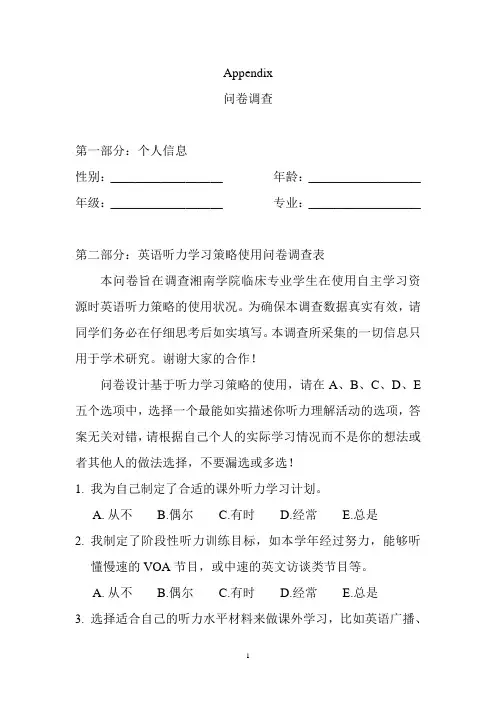
Appendix问卷调查第一部分:个人信息性别:__________________ 年龄:__________________ 年级:__________________ 专业:__________________第二部分:英语听力学习策略使用问卷调查表本问卷旨在调查湘南学院临床专业学生在使用自主学习资源时英语听力策略的使用状况。
为确保本调查数据真实有效,请同学们务必在仔细思考后如实填写。
本调查所采集的一切信息只用于学术研究。
谢谢大家的合作!问卷设计基于听力学习策略的使用,请在A、B、C、D、E 五个选项中,选择一个最能如实描述你听力理解活动的选项,答案无关对错,请根据自己个人的实际学习情况而不是你的想法或者其他人的做法选择,不要漏选或多选!1.我为自己制定了合适的课外听力学习计划。
A.从不B.偶尔C.有时D.经常E.总是2.我制定了阶段性听力训练目标,如本学年经过努力,能够听懂慢速的VOA节目,或中速的英文访谈类节目等。
A.从不B.偶尔C.有时D.经常E.总是3.选择适合自己的听力水平材料来做课外学习,比如英语广播、英文电影电视节目。
A.从不B.偶尔C.有时D.经常E.总是4.喜欢和同学或者朋友一起进行听力训练,如一起选定材料,对听力过程进行交流等等。
A.从不B.偶尔C.有时D.经常E.总是5.经常思考有关听力学习方面的知识,如听力过程分几个步骤,影响自己听力的因素等等。
A.从不B.偶尔C.有时D.经常E.总是6.在平时的学习过程中,我注意积累有关语音语调方面的知识,比如连读、爆破、重音弱读、同化、语调升降来帮助提高听力。
A.从不B.偶尔C.有时D.经常E.总是7.我常把能够与的一些语言现象如句子结构、表达方式和汉语进行对比,找出异同,并积累一些中英有明显差异的习惯表达,以此帮助自己更好更快地理解所听内容。
A.从不B.偶尔C.有时D.经常E.总是8.我有意识地通过英语交际来模仿听力中出现的词句内容,并以此进一步挺高英语听力理解。
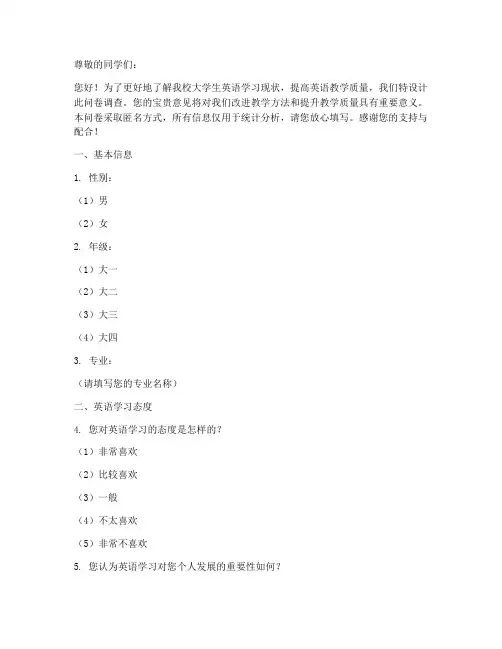
尊敬的同学们:您好!为了更好地了解我校大学生英语学习现状,提高英语教学质量,我们特设计此问卷调查。
您的宝贵意见将对我们改进教学方法和提升教学质量具有重要意义。
本问卷采取匿名方式,所有信息仅用于统计分析,请您放心填写。
感谢您的支持与配合!一、基本信息1. 性别:(1)男(2)女2. 年级:(1)大一(2)大二(3)大三(4)大四3. 专业:(请填写您的专业名称)二、英语学习态度4. 您对英语学习的态度是怎样的?(1)非常喜欢(2)比较喜欢(3)一般(4)不太喜欢(5)非常不喜欢5. 您认为英语学习对您个人发展的重要性如何?(1)非常重要(2)比较重要(3)一般(4)不太重要(5)非常不重要三、英语学习现状6. 您每周用于英语学习的时间大约是多少?(1)少于2小时(2)2-4小时(3)4-6小时(4)6-8小时(5)8小时以上7. 您目前主要使用哪些英语学习资源?(1)教材(2)网络课程(3)英语APP(4)英语杂志/报纸(5)英语辅导书(6)其他(请说明)8. 您认为目前英语学习的主要困难是什么?(1)词汇量不足(2)语法知识薄弱(3)听力理解困难(4)口语表达能力差(5)阅读速度慢(6)写作能力差(7)其他(请说明)9. 您是否参加过英语角、英语演讲比赛等活动?(1)参加过(2)参加过但效果不佳(3)没参加过10. 您认为英语课程设置是否合理?(1)非常合理(2)比较合理(3)一般(4)不太合理(5)非常不合理四、教学建议11. 您对英语教师的教学方法有何建议?(1)增加课堂互动,提高学生参与度(2)注重口语练习,提高口语表达能力(3)加强语法讲解,帮助学生掌握语法知识(4)拓展词汇量,提高阅读理解能力(5)关注学生个体差异,提供个性化辅导(6)其他(请说明)12. 您对英语课程设置有何建议?(1)增加实践环节,提高学生实际应用能力(2)调整课程难度,使课程更符合学生水平(3)增加英语文化知识讲解,拓宽学生视野(4)增设选修课程,满足学生个性化需求(5)其他(请说明)13. 您对英语教学资源有何建议?(1)提供更多优质的网络课程和英语学习APP(2)增加英语图书、期刊等资源(3)建立英语学习交流平台,方便学生互相学习(4)其他(请说明)感谢您抽出宝贵时间填写这份问卷!我们期待您的宝贵意见,共同为提高英语教学质量而努力!祝您学习进步!问卷填写完毕后,请将问卷提交至以下邮箱:*******************再次感谢您的支持与配合!祝您生活愉快!。
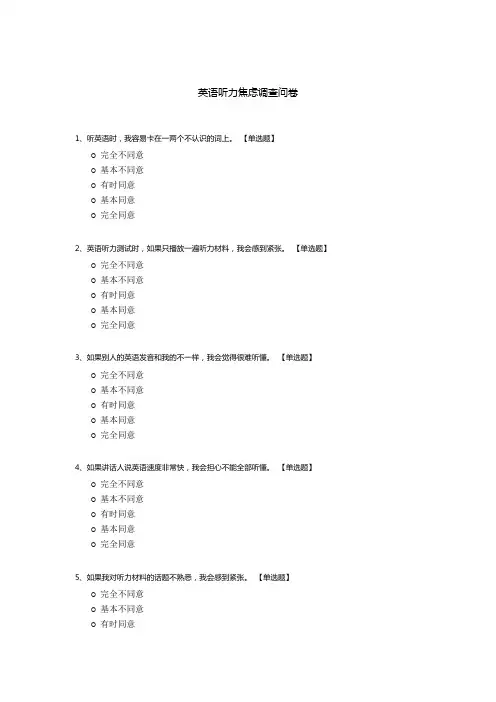
英语听力焦虑调查问卷1、听英语时,我容易卡在一两个不认识的词上。
【单选题】○ 完全不同意○ 基本不同意○ 有时同意○ 基本同意○ 完全同意2、英语听力测试时,如果只播放一遍听力材料,我会感到紧张。
【单选题】○ 完全不同意○ 基本不同意○ 有时同意○ 基本同意○ 完全同意3、如果别人的英语发音和我的不一样,我会觉得很难听懂。
【单选题】○ 完全不同意○ 基本不同意○ 有时同意○ 基本同意○ 完全同意4、如果讲话人说英语速度非常快,我会担心不能全部听懂。
【单选题】○ 完全不同意○ 基本不同意○ 有时同意○ 基本同意○ 完全同意5、如果我对听力材料的话题不熟悉,我会感到紧张。
【单选题】○ 完全不同意○ 基本不同意○ 有时同意○ 基本同意○ 完全同意6、听英语时,我很容易猜测出漏听部分的内容。
【单选题】○ 完全不同意○ 基本不同意○ 有时同意○ 基本同意○ 完全同意7、听英语时,若稍微走神,我会担心错过重要内容。
【单选题】○ 完全不同意○ 基本不同意○ 有时同意○ 基本同意○ 完全同意8、听英语时,若看不到讲话人的口型或是面部表情,我会感到担心。
【单选题】○ 完全不同意○ 基本不同意○ 有时同意○ 基本同意○ 完全同意9、英语听力测试中,若不能听明白每一个单词,我就会感到紧张慌乱。
【单选题】○ 完全不同意○ 基本不同意○ 有时同意○ 基本同意○ 完全同意10、听英语时,我很难辨别开不同的单词。
【单选题】○ 完全不同意○ 基本不同意○ 有时同意○ 基本同意○ 完全同意11、英语听力课上,若没有相关的文本材料可供参考,我会感到不安。
【单选题】○ 完全不同意○ 基本不同意○ 有时同意○ 基本同意○ 完全同意12、我很难听懂课堂上老师的英文讲解。
【单选题】○ 完全不同意○ 基本不同意○ 有时同意○ 基本同意○ 完全同意13、我很难集中精力听别人讲的英语内容,除非是熟人。
【单选题】○ 完全不同意○ 基本不同意○ 有时同意○ 基本同意○ 完全同意14、听英语时,我感到很不自信。
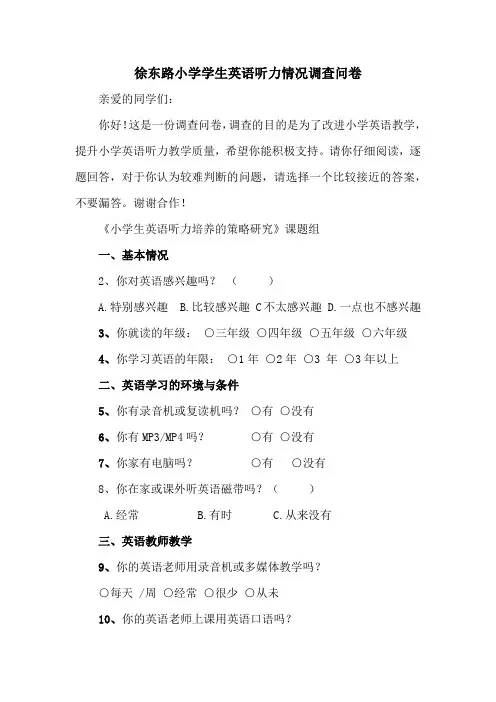
徐东路小学学生英语听力情况调查问卷亲爱的同学们:你好!这是一份调查问卷,调查的目的是为了改进小学英语教学,提升小学英语听力教学质量,希望你能积极支持。
请你仔细阅读,逐题回答,对于你认为较难判断的问题,请选择一个比较接近的答案,不要漏答。
谢谢合作!《小学生英语听力培养的策略研究》课题组一、基本情况2、你对英语感兴趣吗?()A.特别感兴趣B.比较感兴趣 C不太感兴趣 D.一点也不感兴趣3、你就读的年级:○三年级○四年级○五年级○六年级4、你学习英语的年限:○1年○2年○3 年○3年以上二、英语学习的环境与条件5、你有录音机或复读机吗?○有○没有6、你有MP3/MP4吗?○有○没有7、你家有电脑吗?○有○没有8、你在家或课外听英语磁带吗?()A.经常B.有时C.从来没有三、英语教师教学9、你的英语老师用录音机或多媒体教学吗?○每天 /周○经常○很少○从未10、你的英语老师上课用英语口语吗?○每天/周○经常○很少○从未11、你们在英语课堂上练习英语听力吗?○每天/周○经常○很少○从未四、学习的态度12、在学校,你课后主动练习听力吗?○每天/周○经常○很少○从未13、在周末,你练习英语听力吗?○每天/周○经常○很少○从未14、你平时读英语时使用连读、弱读吗?○每天/周○经常○很少○从未15、你买过听力练习资料吗?○每天/周○经常○很少○从未五、家庭重视方面16、你的父母关心你的英语学习在乎成绩吗?○每天/周○经常○很少○从未17、你的父母督促你练习英语听力吗?○每天/周○经常○很少○从未18、你的父母给你买英语听力资料吗?○每天/周○经常○很少○从未。
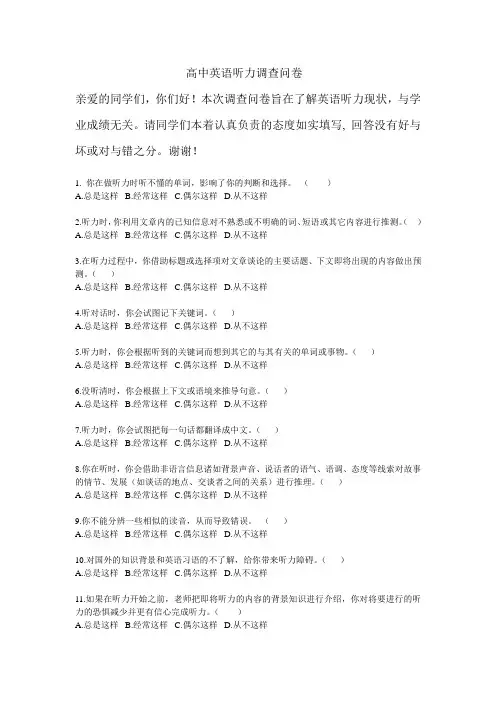
高中英语听力调查问卷亲爱的同学们,你们好!本次调查问卷旨在了解英语听力现状,与学业成绩无关。
请同学们本着认真负责的态度如实填写, 回答没有好与坏或对与错之分。
谢谢!1. 你在做听力时听不懂的单词,影响了你的判断和选择。
()A.总是这样B.经常这样C.偶尔这样D.从不这样2.听力时,你利用文章内的已知信息对不熟悉或不明确的词、短语或其它内容进行推测。
()A.总是这样B.经常这样C.偶尔这样D.从不这样3.在听力过程中,你借助标题或选择项对文章谈论的主要话题、下文即将出现的内容做出预测。
()A.总是这样B.经常这样C.偶尔这样D.从不这样4.听对话时,你会试图记下关键词。
()A.总是这样B.经常这样C.偶尔这样D.从不这样5.听力时,你会根据听到的关键词而想到其它的与其有关的单词或事物。
()A.总是这样B.经常这样C.偶尔这样D.从不这样6.没听清时,你会根据上下文或语境来推导句意。
()A.总是这样B.经常这样C.偶尔这样D.从不这样7.听力时,你会试图把每一句话都翻译成中文。
()A.总是这样B.经常这样C.偶尔这样D.从不这样8.你在听时,你会借助非语言信息诸如背景声音、说话者的语气、语调、态度等线索对故事的情节、发展(如谈话的地点、交谈者之间的关系)进行推理。
()A.总是这样B.经常这样C.偶尔这样D.从不这样9.你不能分辨一些相似的读音,从而导致错误。
()A.总是这样B.经常这样C.偶尔这样D.从不这样10.对国外的知识背景和英语习语的不了解,给你带来听力障碍。
()A.总是这样B.经常这样C.偶尔这样D.从不这样11.如果在听力开始之前,老师把即将听力的内容的背景知识进行介绍,你对将要进行的听力的恐惧减少并更有信心完成听力。
()A.总是这样B.经常这样C.偶尔这样D.从不这样12.如果听力的内容是你从前没有接触过的话题时,你会很紧张,头脑一片空白。
()A.总是这样B.经常这样C.偶尔这样D.从不这样13.在听力播放过程中,你很难集中精力总是开小差。

英语语音问卷调查1、性别【单选题】○ 男○ 女2、出生年份【填空题】________________________3、出生地点(省/市/县)【填空题】________________________4、成长地点(省/市/县)【填空题】________________________5、出生地方言【填空题】________________________6、成长地方言【填空题】________________________7、平时家人和亲戚朋友间主要交流语言为【单选题】○ 方言○ 普通话8、平时你和家人、亲朋间主要交流语言为【单选题】○ 方言○ 普通话9、小学阶段校园里主要使用的语言【单选题】○ 方言○ 普通话10、小学阶段校园里主要使用的语言【单选题】○ 方言○ 普通话11、你认为家人、老师、朋友的普通话【单选题】○ 方言口音不明显○ 有一些地方口音○ 地方口音很重12、你正式开始学英语的时间是?(请注明小学、初中、高中的具体年级别)【填空题】________________________13、小学阶段是否学习音标?【单选题】○ 有○ 没有14、小学英语老师的主要教学方法【单选题】○ 带读○ 听录音○ 小学没有学音标15、小学英语老师是否指出你的发音问题?【单选题】○ 有○ 没有○ 小学没有学音标16、小学英语老师是否传授发音方法?【单选题】○ 有○ 没有○ 没有学英语17、你认为你的小学英语老师的英语发音【单选题】○ 地方口音不明显○ 有一些地方口音○ 选项118、你中学阶段是否学习音标?【单选题】○ 有○ 没有19、中学阶段英语老师是否传授发音方法?【单选题】○ 有○ 没有20、你的中学英语老师主要教学方法是?【单选题】○ 带读○ 听录音21、你认为你的中学英语老师发音【单选题】○ 地方口音不明显○ 有一些地方音○ 地方口音严重22、你认为自己的英语发音水平如何?【单选题】○ 很差○ 较差○ 一般○ 较好○ 很好23、你学习和提高英语发音水平的动力有多少?【单选题】○ 很弱○ 较弱○ 一般○ 较强○ 很强24、在听自己的英语朗读录音时,你是否能判断自己读音方面的优缺点?【单选题】○ 完全不能○ 基本不能○ 不确定○ 基本能25、下列纠正英语发音的途径,你觉得哪些效果好?请按照效果从高至低排序【排序题】(请填1-3数字排序)_____自我独立纠正发音_____同学互相纠正发音_____教师指导纠正发音26、你认为教师给学生进行“一对一”的语音辅导必要性有多少?【单选题】○ 非常不必要○ 不必要○ 一般○ 有必要○ 非常有必要27、你觉得“朗读英文故事”这样的方式是否能帮助你提高英语发音水平?(请简要注明具体内容)【填空题】________________________28、你觉得“配音”这样的方式是否能帮助你提高英语发音水平?(请简要注明具体内容)【填空题】________________________29、你觉得“唱英文歌”这样的方式是否能帮助你提高英语发音水平?(请简要注明具体内容)【填空题】________________________30、你是否有视频或音频材料供自己语音练习用。
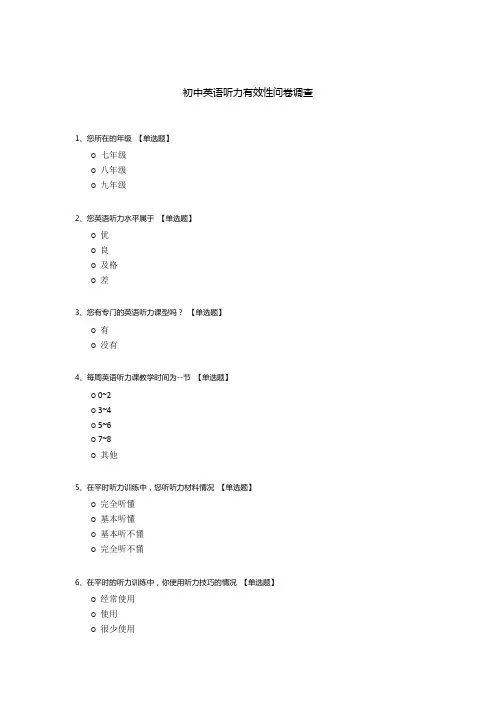
初中英语听力有效性问卷调查1、您所在的年级【单选题】○ 七年级○ 八年级○ 九年级2、您英语听力水平属于【单选题】○ 优○ 良○ 及格○ 差3、您有专门的英语听力课型吗?【单选题】○ 有○ 没有4、每周英语听力课教学时间为--节【单选题】○ 0~2○ 3~4○ 5~6○ 7~8○ 其他5、在平时听力训练中,您听听力材料情况【单选题】○ 完全听懂○ 基本听懂○ 基本听不懂○ 完全听不懂6、在平时的听力训练中,你使用听力技巧的情况【单选题】○ 经常使用○ 使用○ 很少使用○ 完全不适用7、您的英语基础知识掌握情况【单选题】○ 完全掌握○ 基本掌握○ 基本没有掌握○ 完全没有掌握8、您对英语听力学习是否有明确的学习目标【单选题】○ 非常明确○ 明确○ 模糊○ 没有9、您对英语听力学习是否有坚定学习信心【单选题】○ 强○ 较强○ 较弱○ 弱10、您对英语听力学习是否体会到学习乐趣【单选题】○ 强○ 较强○ 较弱○ 弱11、英语课上,您英语老师使用英语授课情况【单选题】○ 完全使用○ 大部分使用○ 大部分不使用○ 完全不使用12、您使用英语交流的情况【单选题】○ 经常使用○ 有时使用○ 偶尔使用○ 难得使用13、您的英语思维能力【单选题】○ 强○ 较强○ 较弱○ 弱14、您周围的英语学习氛围【单选题】○ 浓○ 较浓○ 较弱○ 弱15、您上英语课使用的工具【多选题】□ 录音机□ 黑板□ 白板□ 电脑□ 投影仪。
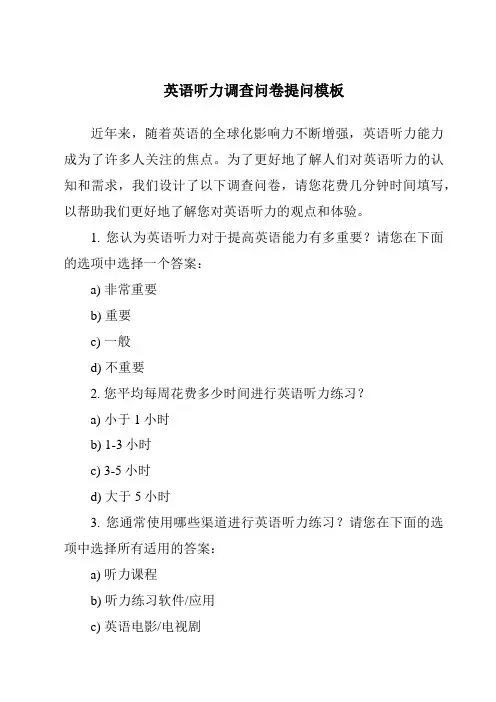
英语听力调查问卷提问模板近年来,随着英语的全球化影响力不断增强,英语听力能力成为了许多人关注的焦点。
为了更好地了解人们对英语听力的认知和需求,我们设计了以下调查问卷,请您花费几分钟时间填写,以帮助我们更好地了解您对英语听力的观点和体验。
1. 您认为英语听力对于提高英语能力有多重要?请您在下面的选项中选择一个答案:a) 非常重要b) 重要c) 一般d) 不重要2. 您平均每周花费多少时间进行英语听力练习?a) 小于1小时b) 1-3小时c) 3-5小时d) 大于5小时3. 您通常使用哪些渠道进行英语听力练习?请您在下面的选项中选择所有适用的答案:a) 听力课程b) 听力练习软件/应用c) 英语电影/电视剧d) 英语广播/播客e) 英语歌曲f) 其他(请注明)4. 您认为在英语听力中最具挑战的是什么?请您在下面的选项中选择一个答案:a) 语速过快b) 发音不清晰c) 词汇量不足d) 听力材料难度大e) 其他(请注明)5. 您通常如何提高英语听力能力?请您在下面的选项中选择所有适用的答案:a) 多听英语材料b) 做听力练习题c) 注重词汇积累d) 寻找适合自己水平的听力材料e) 参加听力培训班/课程f) 其他(请注明)6. 您认为什么因素会影响您进行英语听力练习的积极性?请您在下面的选项中选择所有适用的答案:a) 缺乏时间b) 缺乏兴趣c) 缺乏合适的听力材料d) 缺乏有效的学习方法e) 其他(请注明)7. 您对于提高英语听力能力有什么建议或期望?请您在下面的空白处写下您的回答。
感谢您抽出宝贵的时间填写我们的调查问卷!您的意见对于我们改进英语听力教学和提供更好的学习资源至关重要。
如果您对调查结果感兴趣,可以在问卷提交后留下您的电子邮件地址,我们将会与您分享调查结果。
再次感谢您的参与!。
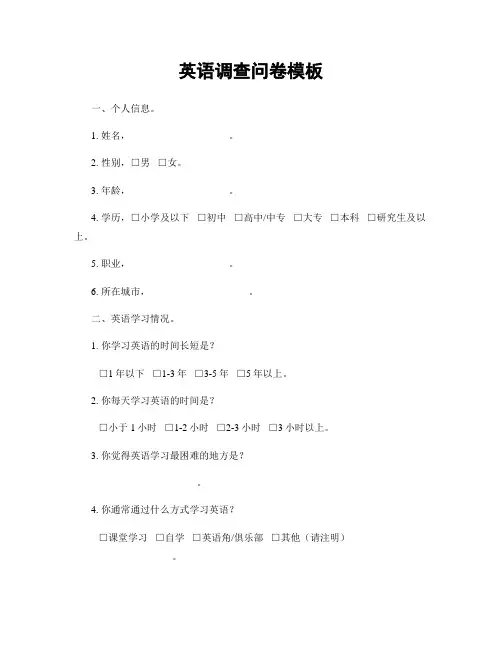
英语调查问卷模板一、个人信息。
1. 姓名,____________________。
2. 性别,□男□女。
3. 年龄,____________________。
4. 学历,□小学及以下□初中□高中/中专□大专□本科□研究生及以上。
5. 职业,____________________。
6. 所在城市,____________________。
二、英语学习情况。
1. 你学习英语的时间长短是?□1年以下□1-3年□3-5年□5年以上。
2. 你每天学习英语的时间是?□小于1小时□1-2小时□2-3小时□3小时以上。
3. 你觉得英语学习最困难的地方是?____________________。
4. 你通常通过什么方式学习英语?□课堂学习□自学□英语角/俱乐部□其他(请注明)____________________。
三、英语应用情况。
1. 你平时最常用英语的场合是?□工作□学习□旅游□日常交流□其他(请注明)____________________。
2. 你觉得自己的英语口语能力如何?□很差□一般□良好□优秀。
3. 你觉得自己的英语听力能力如何?□很差□一般□良好□优秀。
4. 你觉得自己的英语阅读能力如何?□很差□一般□良好□优秀。
5. 你觉得自己的英语写作能力如何?□很差□一般□良好□优秀。
四、英语学习需求。
1. 你最希望提高的英语技能是?□口语□听力□阅读□写作。
2. 你觉得最需要改进的英语方面是?□语法□词汇□表达能力□其他(请注明)____________________。
3. 你觉得最需要的英语学习资源是?□教材□词汇书□听力材料□口语练习□其他(请注明)____________________。
五、其他建议。
1. 你对英语学习有什么其他想说的吗?____________________。
以上是关于英语学习情况的调查问卷,希望您能认真填写,您的意见对我们的研究具有重要意义。
谢谢您的配合!。
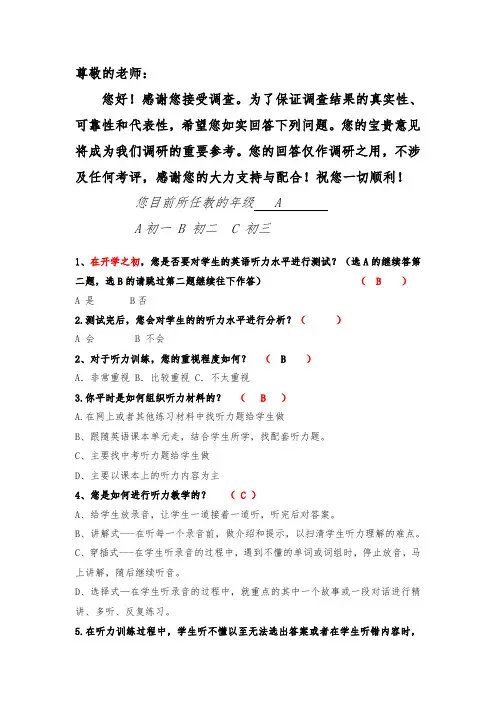
尊敬的老师:您好!感谢您接受调查。
为了保证调查结果的真实性、可靠性和代表性,希望您如实回答下列问题。
您的宝贵意见将成为我们调研的重要参考。
您的回答仅作调研之用,不涉及任何考评,感谢您的大力支持与配合!祝您一切顺利!您目前所任教的年级 AA初一 B 初二 C 初三1、在开学之初,您是否要对学生的英语听力水平进行测试?(选A的继续答第二题,选B的请跳过第二题继续往下作答)( B )A 是 B否2.测试完后,您会对学生的的听力水平进行分析?()A 会B 不会2、对于听力训练,您的重视程度如何?( B )A.非常重视 B.比较重视 C.不太重视3.你平时是如何组织听力材料的?( B )A.在网上或者其他练习材料中找听力题给学生做B、跟随英语课本单元走,结合学生所学,找配套听力题。
C、主要找中考听力题给学生做D、主要以课本上的听力内容为主4、您是如何进行听力教学的?( C )A、给学生放录音,让学生一道接着一道听,听完后对答案。
B、讲解式---在听每一个录音前,做介绍和提示,以扫清学生听力理解的难点。
C、穿插式---在学生听录音的过程中,遇到不懂的单词或词组时,停止放音,马上讲解,随后继续听音。
D、选择式—在学生听录音的过程中,就重点的其中一个故事或一段对话进行精讲、多听、反复练习。
5.在听力训练过程中,学生听不懂以至无法选出答案或者在学生听错内容时,你会( A )A、给学生一些提示,如提供一些关键词,利用图片、图表来预测听力材料的内容。
B、给学生重复放听力内容,直到听懂为止C、鼓励学生自己把听到的信息与自己的已有知识联系起来以得出答案。
6、在听力训练中,你的学生表现如何?( B )A.对听力内容能够理解,根据理解回答问题B.对听力内容不能理解,在连蒙带猜中回答问题C.能理解一部分听力内容,回答问题只是支言片语D、不知道,没关注过8、在听力教学中,您注重( B )A听力内容,要求学生听懂材料中的词和句B学生的听力答案是否正确C 听力材料中的语法及词组,并让学生联想和巩固D 学生所掌握的听力技巧9.在听力训练结束后,您是否对学生掌握的听力技巧进行检测?( A )A 是B 否10. 在听力训练结束后,您是否对其从听力中掌握的知识进行巩固总结(要求学生积累听力中遇到的重点的词,短语或句子?)( A )A 是B 否11.在课后,您给学生布置听力作业吗?(选A或C的直接答下一题)( B )A经常B 从不 C 偶尔12.每个学生在课下的听力任务或听力作业都一样吗?( A )A 一样B 不一样。
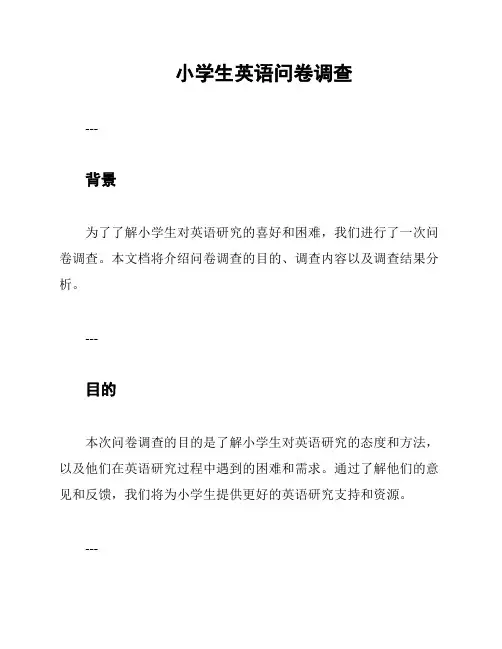
小学生英语问卷调查---背景为了了解小学生对英语研究的喜好和困难,我们进行了一次问卷调查。
本文档将介绍问卷调查的目的、调查内容以及调查结果分析。
---目的本次问卷调查的目的是了解小学生对英语研究的态度和方法,以及他们在英语研究过程中遇到的困难和需求。
通过了解他们的意见和反馈,我们将为小学生提供更好的英语研究支持和资源。
---调查内容1. 你喜欢研究英语吗?- 是- 否2. 你觉得研究英语有哪些好处?- 可以和外国人交流- 增加知识- 可以更好地了解其他文化3. 你喜欢用什么方式研究英语?- 听录音- 看视频- 读书- 参加英语角- 其他(请注明)4. 研究英语的时候,你最困难的是什么?- 听力- 口语- 阅读理解- 写作- 单词记忆- 语法- 其他(请注明)5. 你期望学校如何帮助你提高英语?- 提供更多练机会- 举办英语演讲比赛- 安排英语角活动- 提供更好的教材和研究资源- 其他(请注明)---调查结果分析根据我们对小学生英语问卷调查的结果进行分析,我们得出以下结论:1. 大多数小学生喜欢研究英语,认为研究英语能够带来很多好处,比如与外国人交流、增加知识和了解其他文化等。
2. 小学生最喜欢通过听录音、看视频和读书的方式研究英语。
3. 研究英语过程中,小学生最困难的是听力和口语,其次是阅读理解和写作。
4. 小学生希望学校能提供更多的练机会,举办英语演讲比赛和英语角活动,并提供更好的教材和研究资源。
根据调查结果,我们将根据小学生的需求和困难,开发更多针对性的英语研究资源和活动,帮助他们更好地提高英语水平。
---以上是关于小学生英语问卷调查的文档。
如有疑问或需要进一步了解调查结果,请随时联系我们。
谢谢!。
Introduction:Dear [Student/Participant],We are conducting a survey to better understand your experiences and perceptions regarding the English listening assignments in our course. Your feedback is crucial for us to improve the effectiveness and engagement of these assignments. This questionnaire should take approximately 10-15 minutes to complete. All responses will be kept confidential, and the results will be used to enhance our teaching methods. Thank you for your time and participation.Section 1: Background Information1. What is your current level of English proficiency?- A. Beginner- B. Intermediate- C. Advanced- D. Native Speaker2. Which course are you currently enrolled in that includes English listening assignments?- A. English as a Second Language (ESL)- B. English Language Arts- C. Business English- D. Other (Please specify)3. How often are you required to complete English listening assignments?- A. Once a week- B. Twice a week- C. Once a month- D. RarelySection 2: Listening Assignments4. On a scale of 1 to 5 (1 being lowest, 5 being highest), how would you rate the difficulty of the listening assignments?- 1. Very Easy- 2. Easy- 3. Moderate- 4. Hard- 5. Very Hard5. How do you typically prepare for your English listening assignments?- A. Reviewing the listening materials before class- B. Listening to the materials multiple times- C. Discussing the assignments with classmates- D. Other (Please specify)6. Do you find the listening assignments to be helpful in improving your English listening skills?- A. Extremely helpful- B. Very helpful- C. Somewhat helpful- D. Not helpful- E. Unhelpful7. What types of listening materials do you prefer for your assignments?- A. News broadcasts- B. Podcasts- C. Conversations- D. Narrated stories- E. Academic lectures- F. Other (Please specify)8. How often do you encounter difficulties while listening to the assigned materials?- A. Always- B. Often- C. Sometimes- D. Rarely- E. Never9. What are the main challenges you face when completing listening assignments?- A. Difficulty understanding the spoken English- B. Limited vocabulary knowledge- C. Slow listening speed- D. Difficulty following the plot or context- E. Other (Please specify)Section 3: Course and Teaching Methods10. How would you rate the clarity and organization of the instructions provided for the listening assignments?- 1. Poor- 2. Fair- 3. Good- 4. Very Good- 5. Excellent11. Are the listening assignments aligned with the course objectives and learning outcomes?- A. Strongly agree- B. Agree- C. Neutral- D. Disagree- E. Strongly disagree12. How effective do you find the feedback provided on your listening assignments?- A. Extremely effective- B. Very effective- C. Somewhat effective- D. Not effective- E. Ineffective13. What additional resources or support would you like to have to improve your listening skills?- A. Access to a wider variety of listening materials- B. Additional practice exercises- C.。
英语学习的调查问卷英文版篇一:英语学习问卷调查表学生英语学习情况问卷1. 你喜欢上英语课吗?A.喜欢 B. 不喜欢 C.无所谓2. 你以前接触过报刊英语吗?A. 接触过B. 没C. 没听说过3. 你认为英语怎么样才算学得好?A. 口语好B. 试卷答得好C. 综合能力强4. 你有背英语课文的习惯吗?A. 有B. 没有C. 以前有5. 你对听英语讲座感兴趣吗?A.感兴趣B. 不感兴趣 C. 没听过6. 你有看英文小说(或中英版小说)的经历吗?A. 没有B. 有C. 根本没想过7. 你在进行阅读的时候,最大的障碍是什么?________。
A.词汇量、语法知识不丰富B.阅读时不能专心C.综合理解能力不高D.阅读速度慢8. 你感兴趣的英语阅读材料的内容是:A.娱乐 B. 文学 C. 社会 D. 校园 E.科技 F. 人物 G. 其它9. 你进行课外阅读训练的目的是什么?__________。
A. 拓展自己的词汇量,提高自己的语言运用能力B. 为了考试得高分C. 为了完成老师布置的作业,不得不做D. 没有训练的必要,我一点都不愿意做10. 当你阅读时,你习惯于:A. 快速默读B. 出声读C. 不出声但发音器官在动D. 边读边用笔划线11. 你所读的英语材料以什么为主?(可多选)A.报刊B.杂志C.原版小说D.《书虫》系列12. 除了教材,你还读其他的英语材料吗?A. 不读B.偶尔C. 只读老师布置的D. 经常读13. 除了看书,你还看英语电影或电视吗?A.不看 B. 偶尔C. 经常看14. 如看英语电影或电视,那么你看的英语电影或电视是何种形式的?A.英语发声且无中文字幕的原版片B.英语发声但有中文字幕的原版片 C.中文发声且有中文字幕的英语片15. 你觉得在英语阅读过程中,最大的障碍是A.生词B.对句子的理解C.对整篇文章的理解16.在你平时做英语阅读训练时,对文段中新的单词或短语会A.立刻查字典B.根据上下文猜测其意思C.直接跳过17.在阅读过程中,你经常会重读吗?A.总是,因为读过一遍后不知道读了什么B.偶尔C.从不18. 你觉得今后在工作岗位中你会用到英语吗?A. 会B. 不会C. 不知道19. 你认为掌握一门外语对今后找工作有没有帮助?A. 有B. 没有C. 不知道20. 请你谈一谈今后怎么样上英语课才能提高你对英语的学习兴趣篇二:关于英语学习的调查问卷关于英语学习的调查问卷 1 您认为最好的学习英语年龄段是几岁?2 您认为您的孩子学几年英语就可以拥有和外国孩子同样的英语会话阅读能力?3您认为怎样的英语学习是最有效的?(1)无意识(2)有意识4 您认为学习英语一定要学习语法吗?5您认为理解并会翻译英语是最好的学习英语方式吗?6您对才能递减法及学习壁障有了解吗?7您会给孩子选择学习英语吗?篇三:英语学习调查问卷你的英语听力如何:A、很好B、好C、一般D、较差在以前的三个学期中你的英语成绩平均多少分?A、80分以上B、70-80C、60-70D、60分以下您每天用多少时间学习英语?A、几乎没有B、少于1小时C、1-2小时D、2小时以上您对学习英语感到?A、轻松 B.、不太困难 C、困难 D、很困难您学习英语的目的是什么?A、社会需求,与国际接轨B、应付考试C、自身幸福满足D、对考研出国的需求您觉得学习英语最难的是什么?A、单词B、语法C、听力D、写作请问您认为英语学得好的原因是什么?A、个人学习方法和策略B、学习环境和条件C、个人天赋D、教师水平您认为提升英语最有效的方式是A、正常英语授课教学B、多考试多做题C、自学D、集中培训您觉得现在的大学英语课程能否帮助你提高英语水平?A、帮助很大B、勉强可以C、没有影响D、课程没什么用您有没有为学习英语制定一个具体的学习计划?A、有,并能很好完成B、有,但是不能坚持到最后C、偶尔,但并未按计划执行D、从不学习英语起始时间A、小学B、初中C、高中D、大学学习英语的动因及目的A、学校课程要求B、未来职业需要C、个人技能培养D、丰富课余生活E、四六级等英语证书考取F、对语言的热爱G、其他您对现有班级英语教学规模的态度A、满意B、较满意C、不太满意D、很不满意本科英语学习中教师授课方式A、教师主讲,无学生提问时间B、讲授与问答结合C、以解答学生提问为主要授课方式D、小组任务式教学您对现有课堂学习方式的态度A、非常喜欢B、喜欢C、一般D、反感您所期望的英语教学方式A、教师讲,学生听B、以学生自学为主,教师只做指导C、完全依靠自学D、其他日常英语学习中所遇到的问题A、单词B、语法C、听力D、口语E、写作F、其他能否运用英语进行基本的会话交流A、非常纯熟B、可以但不流利C、只限简单对话D、完全不行日常英语交流中的问题A、听不懂B、词汇量贫乏C、语言的组织(语法)D、胆怯心理E、无交流对象F、其他希望加强的英语学习项目A、听力与口语B、阅读与写作C、翻译技巧D、专业英语E、其他你认为在英语学习听、说、读、写这四项技能中,哪一项最重要?A、听B、说C、读D、写你认为在英语学习听、说、读、写这四项技能中,哪一项最能体现你的英语水平?A(转载于: 小龙文档网:英语学习的调查问卷英文版)、听B、说C、读 D、写你对学习英语口语的兴趣______.A、很大B、一般C、不太大D、没有你的英语口语如何?A、能基本自由会话B、会说几个句子C、能说几个单词D、几乎不能开口你能听懂老师以英语为主组织的课堂教学呢?A、基本能够B、听懂大部分C、懂一部分D、几乎听不懂你是否练习经常练习口语?A、经常练习B、不常练习,除非是老师的作业C、偶尔说几句D、只在老师上课提问时回答问题,否则不愿意开口你在口语练习中遇到的最大的困难是A、不懂语法B、词汇量太少C、语音语调不好D、初中基础差,发音不好E、胆子小,害怕犯错你本人对自己的口语水平满意吗?A、满意B、比较满意C、不满意D、很不满意你希望通过以下哪种活动方式来提高你的口语水平?A、开展专家讲座B、开展演讲朗诵比赛C、看英文原声电影,唱英文歌D、开展英语角活动E、其它你认为以哪种方式练习最好?A、个人活动B、两人活动C、小组活动D、班团活动你的英语任课老师用英语授课的程度?A、全英B、大部分是英语C、一半中文一半英文D、很少用英语学校是否经常开展诸如英语角、英语演讲比赛之类的活动?。
英语调查问卷模板引言本调查问卷旨在了解个人对于学习英语的态度、学习方式以及对于英语应用的需求等方面的信息。
请您认真、详细地回答以下问题,以便我们更好地满足您的需求和改善英语学习环境。
感谢您参与此次调查!个人信息请您提供以下个人信息,以便我们对调查数据进行分类和分析:1.姓名:2.年龄:3.性别:英语学习情况1.您是否正在学习英语?–[ ] 是–[ ] 否2.如果您正在学习英语,您学习英语的原因是什么?(可多选)–[ ] 提升英语能力–[ ] 出国留学–[ ] 工作需要–[ ] 兴趣爱好–[ ] 其他(请注明):3.您通常在哪些场景下使用英语?(可多选)–[ ] 学校教学–[ ] 工作交流–[ ] 商务洽谈–[ ] 旅行–[ ] 社交交流–[ ] 其他(请注明):4.您对于英语学习的动力是什么?5.您目前的英语水平如何?–[ ] 初级(基本无英语沟通能力)–[ ] 中级(能进行基本日常英语对话)–[ ] 高级(能流利地使用英语进行交流)6.您最想提升的英语技能是什么?(可多选)–[ ] 听力–[ ] 口语–[ ] 阅读–[ ] 写作–[ ] 其他(请注明):英语学习方式1.您通常通过哪些方式进行英语学习?(可多选)–[ ] 参加英语培训班–[ ] 刷英语学习APP–[ ] 看英语电影/电视剧–[ ] 阅读英语书籍/杂志–[ ] 英语口语实践–[ ] 其他(请注明):2.如果您选择参加英语培训班,您更青睐于传统的面对面授课还是在线教育?–[ ] 面对面授课–[ ] 在线教育–[ ] 未参加过英语培训班3.您对英语学习APP的使用情况如何?–[ ] 使用过,觉得效果一般–[ ] 使用过,觉得效果不错–[ ] 未使用过英语学习需求1.您在学习英语的过程中最大的困扰是什么?请详细描述。
2.您希望在英语学习过程中得到哪方面的帮助?3.如果有一种理想的学习工具,您希望它具备哪些功能或特点?结语非常感谢您花费宝贵的时间参与我们的调查问卷。
小学生英语学习情况调查问卷亲爱的同学们:你们好为了进一步提高同学们的英语水平和教师的教课水平,占用同学们一点宝贵的时间,来帮助完成这份问卷调查,本问卷采取无记名的方式,还望同学们认真填写,谢谢大家的合作1、你对英语感兴趣吗A.特别感兴趣B. 比较感兴趣C.不太感兴趣D.一点也不感兴趣2、你在学习英语时遇到的最大困难是A. 读单词B. 读句子C. 背单词D. 写单词E. 没有3、你每天都朗读英语吗A. 是的B. 有时朗读C. 不朗读4、你能认真进行英语书写吗A. 能B.有时能C.不能够5、在家里家长能辅导你学英语吗A.能B.不能6、在学英语中,你遇到的主要困难是什么A.听力B. 口语C.写作D.阅读E.语法7、你讨厌背英文单词吗A. 不讨厌B. 背不出,很讨厌C.还可以8、上英语课时,你会忘记带英语书吗A.不会B. 有时候会忘C.经常忘9、在学习中,你以什么方式记忆最有效A.活学活用B.死记硬背C.只看不写D.只写不看E.多听录音F.边读边写G.其他方式10、现在你学习英语感觉A.容易B.难C.不想学问卷到此结束,再次感谢同学们的积极配合小学英语学习情况调查分析报告这次调查的对象是小学三、四年级学生,共有学生64人,调查了64人,有效62份.从调查所得的数据看,我校小学三、四年级英语教学呈现以下特点:1、一部分学生养成了良好的英语学习习惯.学习任何一门学科,都离不开学生积极主动地学习,离不开良好的学习习惯.从调查的结果看,在小学英语学习上,学生已经具备了学好英语的基本要素.调查数据如下:从以上数据可以看出,能够坚持每天都朗读英语的有20人,占30%.从抽样调查看,全班同学大多数都能认真书写英语,这是学习英语的重要态度.大部分学生都能时刻记着把英语教材和其他教材一起带到学校,这也是英语学习的重要态度.2、英语学习出现了良好的发展势头.正因为有了良好的学习习惯,全校学生现在对英语学习感觉很有兴趣,在学习英语上出现了良好的发展势头:有40.7%的人表示目前学习英语没有困难,26%的人认为背单词有一定的难度要知道,现在的学生对背英语单词最感到头疼.从数据看,只有4个学生讨厌学习英语,绝大多数都很乐意学习英语.正是如此,66.7%的学生感觉学习英语很容易.在“你喜欢什么样的英语课”的调查中,20%的同学喜欢“老师多讲解”,60%的同学希望“多做点课堂活动”.这也提醒我们的教师,要“把地道的英语课堂还给学生”.通过调查问卷显示的问题,找出自己的不足,如培养学生学习兴趣与严格管理相结合,喜欢英语,更要重视英语.自己在这方面需要下功夫.课堂活动单一,没有调动起学生的积极性;没有关注到全体学生,有的学生成绩在班里还可以,但心理上对英语有排斥心理,教师没有发现这些同学的心理变化,未能积极与这些同学进行沟通,这些都是需要以后改进的地方.学生问卷调查分析本次小学生英语学习情况的调查问卷,主要是为有针对性地加强小学英语教学,提高小学英语教学的有效性,有针对性地帮助学生解决小学英语学习中的困难,专门设计此调查问卷,根据调查的结果反馈如下:1、学生对英语喜爱的都是英语学习上较优秀的学生,学困生都不太喜欢本学科.2、多数学生都不太愿意用英语和别人进行交流,并且家长经常辅导的也很少.3、学生在学习英语的过程中,学习兴趣发生了变化.不少学生都是由开始的很感兴趣到最后的不感兴趣,学生对英语的学习意愿也随之降低.4、多数学生不能做到主动预习或复习英语.大部分学生对自己学习小学英语的兴趣和效果不满意以上反馈的信息充分暴露出了学生在英语学习中存在的问题,我们要根据以上问题有针对性的帮助学生解决小学英语学习中存在的问题.。
调查问卷:英语学习一、个人背景信息
请填写以下个人背景信息:
1.姓名:
2.年龄:
3.性别:
4.学历:
5.所在城市:
6.目前职业:
二、英语学习情况
请回答以下问题:
1.学习英语的目的是什么?(可以多选)
–出国留学
–工作需要
–提升自我能力
–旅行使用
–其他,请注明:
2.你平时如何进行英语学习?(可以多选)
–看英文电影/电视剧
–听英文歌曲
–参加英语培训班
–使用英语学习App
–阅读英语文章/书籍
–进行英语对话练习
–其他,请注明:
3.你觉得自己英语学习的最大困难是什么?
4.你最喜欢的英语学习方法是什么?为什么?
5.你有参加过英语考试吗?如果有,请填写考试名称和成绩。
如果没有,请略过此题。
三、英语学习需求
请回答以下问题:
1.对英语的口语能力有何要求?
2.对英语的听力能力有何要求?
3.对英语的阅读能力有何要求?
4.对英语的写作能力有何要求?
5.对英语的词汇量有何要求?
四、英语学习计划
请回答以下问题:
1.你是否有制定过英语学习计划?如果有,请简要描述你的计划内容。
2.你是否有遇到过英语学习计划无法贯彻执行的情况?如果有,请简要说明原因。
3.你认为制定什么样的学习计划能够更有效地提高英语水平?
五、对我们的建议
请回答以下问题:
1.你对我们提供的英语学习服务有何期望?
2.如果你可以自由选择一个英语学习的主题,
你会选择什么?
3.你对英语学习的任何其他建议或想法?
谢谢您参与本次调查!对您的支持表示衷心的
感谢!。
关于初中学生英语学习兴趣的调查问卷调查目的
本调查旨在了解初中学生在学习英语过程中的兴趣点以及可能的改进建议,为学校英语教学提供参考。
调查对象
初中阶段的学生
调查内容
请回答以下问题:
1.你对英语学习的兴趣程度如何?(1-5分,1为最低,5为
最高)
2.你认为对于提高英语学习兴趣最有效的方法是什么?
3.你觉得英语课上的教学方式是否足够吸引你的注意力?请
说明原因。
4.你在英语学习过程中最感兴趣的方面是什么?(例如课文、听力、口语等)
5.你认为学校可以如何改进英语教学,提高学生的学习兴趣?
调查结果
经过对初中学生进行调查,得出以下结论:
1.大多数学生对英语学习的兴趣程度居中,但也有一部分学生对英语学习缺乏兴趣。
2.学生普遍认为与语言环境接轨、多实践、多参与英语活动有助于提高英语学习兴趣。
3.有学生反映英语课堂教学内容单一,缺乏趣味性,建议引入更多生动有趣的教学方式。
4.学生在英语学习中更感兴趣的方面主要集中在口语和听力训练上。
5.学生希望学校能够提供更多英语实践机会,如英语角、英语演讲比赛等,以激发学习兴趣。
总结
针对初中学生的英语学习兴趣调查,我们了解到学生们的学习兴趣普遍存在,但也有需要改进的地方。
学校在英语教学中可以多出一些创新,增加趣味性,激发学生学习兴趣,从而提高教学效果。
以上为初中学生英语学习兴趣的调查问卷文档,感谢您的参与!。
学生英语听力问卷调查表
亲爱的同学们:通过一段时间的英语听力学习,你一定取得了进步,请你认真填写问卷调查,以便老师了解大家学习英语的状况,促进今后英语学习。
说明: 1.要实事求是填写
2.每题思考后,在序号上打“√”
3.每题只能选择一个答案
1. 当我一听到英语听力材料时就会紧张。
①完全不同意②不同意③无意见④同意⑤完全同意
2. 听英语时我总是希望听懂每一个单词。
①完全不同意②不同意③无意见④同意⑤完全同意
3. 如果一个单词出现多次都没有听懂,我会很着急。
①完全不同意②不同意③无意见④同意⑤完全同意
4. 听英语时我能够很快抓住内容的中心思想。
①完全不同意②不同意③无意见④同意⑤完全同意
5. 我会很顺畅地根据说话者所说的内容推测下面的内容。
①完全不同意②不同意③无意见④同意⑤完全同意
6. 我不会对听不懂的每一个细节内容在意。
①完全不同意②不同意③无意见④同意⑤完全同意
7. 当听力难度超出我的现有水平时,我很焦虑。
①完全不同意②不同意③无意见④同意⑤完全同意
8. 听英语听力材料时我会想一些和听力学习内容无关的事。
①完全不同意②不同意③无意见④同意⑤完全同意
9. 听英语时很紧张,以致知道的东西都忘了。
①完全不同意②不同意③无意见④同意⑤完全同意
10. 上英语听力课时,我担心课堂学习失败。
①完全不同意②不同意③无意见④同意⑤完全同意
11. 当我听不懂老师用英语纠正我的错误时,我会感到不安。
①完全不同意②不同意③无意见④同意⑤完全同意
12. 总是会想到其他同学的听力比我好。
①完全不同意②不同意③无意见④同意⑤完全同意
13. 我不明白为什么有些人不喜欢上听力课。
①完全不同意②不同意③无意见④同意⑤完全同意
14. 我希望老师不要在课堂进行随堂听力测试。
①完全不同意②不同意③无意见④同意⑤完全同意
15. 听力测试准备的很充分,但还是感到紧张。
①完全不同意②不同意③无意见④同意⑤完全同意
16. 我在英语听力测试中很放松。
①完全不同意②不同意③无意见④同意⑤完全同意
17. 期末考试时我担心听力测试部分成绩不理想。
①完全不同意②不同意③无意见④同意⑤完全同意
18. 英语考试中听力占40分(按100分计),我对通过非常担心。
①完全不同意②不同意③无意见④同意⑤完全同意
19. 我认为听力练习越多时,学生出现焦虑的频率就会越低。
①完全不同意②不同意③无意见④同意⑤完全同意
20. 我认为降低学生英语听力焦虑的关键是老师应该提高听力教学水平。
①完全不同意②不同意③无意见④同意⑤完全同意。